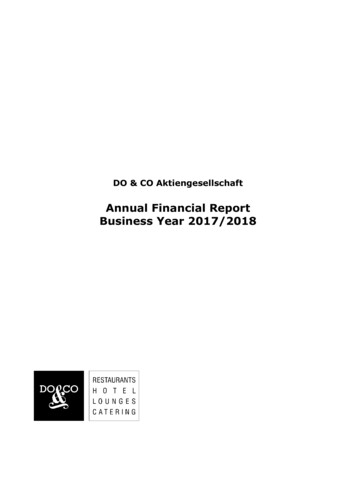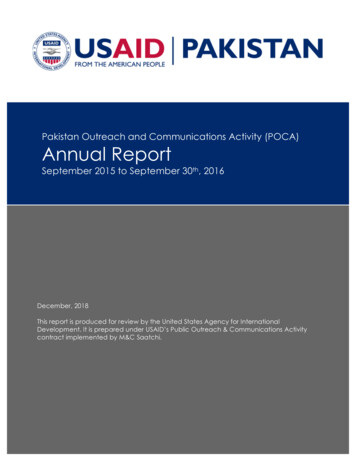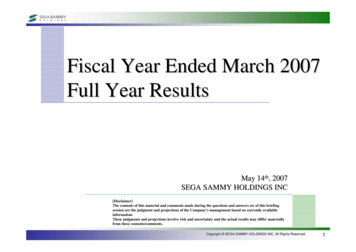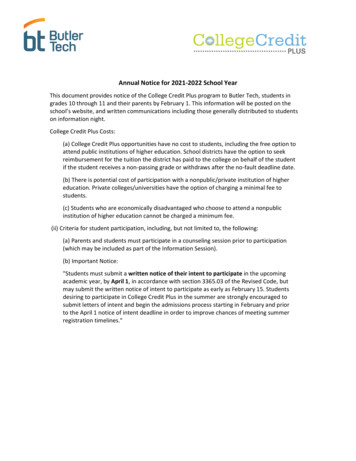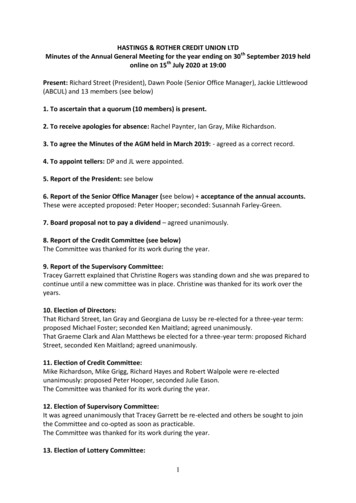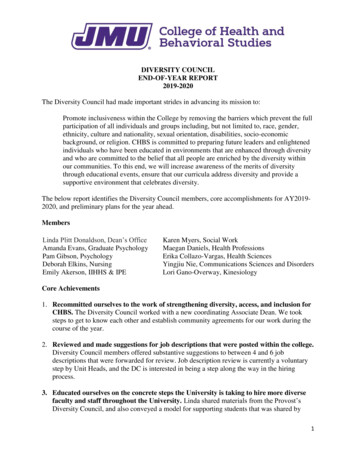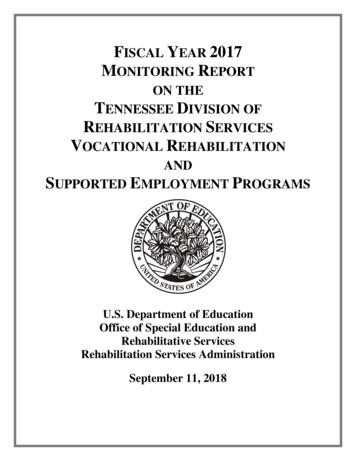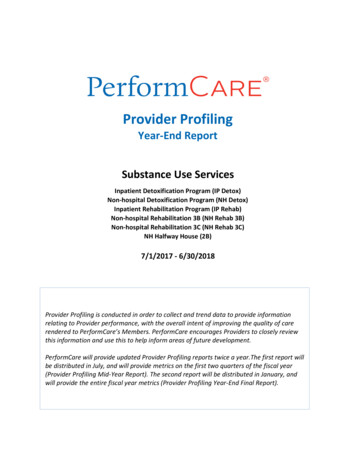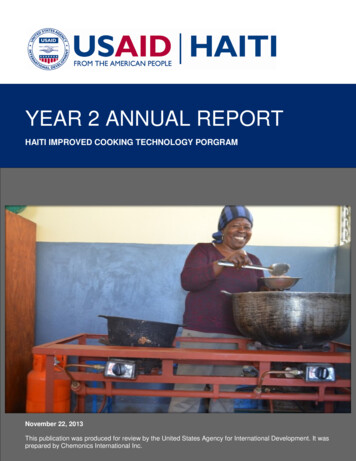
Transcription
YEAR 2 ANNUAL REPORTHAITI IMPROVED COOKING TECHNOLOGY PORGRAMNovember 22, 2013This publication was produced for review by the United States Agency for International Development. It wasprepared by Chemonics International Inc.
YEAR 2 ANNUAL REPORTHAITI IMPROVED COOKING TECHNOLOGY PROGRAMOCTOBER 1ST 2012 - SEPTEMBER 30TH 2013Contract No. AID-521-C-12-0003
CONTENTSSECTION 1: INTRODUCTION .1SECTION 2: OVERVIEW AND SUMMARY OF RESULTS.3SECTION 3: COMPONENT 1 – RESULTS AND DISCUSSION .9SECTION 4: COMPONENT 2 – RESULTS AND DISCUSSION . 21SECTION 5: COMPONENT 3 – RESULTS AND DISCUSSION . 33SECTION 6: COMPONENT 4 – RESULTS AND DISCUSSION . 36SECTION 7: COMPONENT 5 – RESULTS AND DISCUSSION . 41SECTION 8: MONITORING AND EVALUATION . 458.1Annual Results . 458.2Street Vendor Survey . 50SECTION 9: MARKETING AND GENDER . 519.1Marketing Campaigns . 519.2Gender . 63SECTION 10: CONCLUSION. 66Year 2 Annual Reporti
ACRONYMSAANAutorité aéroportuaire nationaleACMEA microfinance institution with retail offices in Port-au-PrinceAMURTAnanda Marga Universal Relief Team (an NGO registered in Haiti)ANADIPPAssociation nationale des distributeurs de produits pétroliersBIDBanque Interaméricaine de DéveloppementBMEBureau des mines et de l’énergieBMPBest management practiceBOPBase of the pyramid (marketing)C&KA hardware store and importer of LPG stoves and partsCCTCDMControlled cooking testCentre de Développement et d’Investissements en Fabrication d’EquipementsEnergétiques en HaïtiClean Development Mechanism (UN)CERCertified emissions reductionCFICentre de facilitation des investissementsCMECoordinating or managing entityCORContracting officer’s representativeCPACDM Program ActivityCQCC-Quest CapitalD&ED&E Green is a Haitian company manufacturing improved charcoal stovesDEFDépartement de l'Enseignement Fondamental (MENFP)DNADesignated national authorityDNVDer Norske Veritas (a designated operational entity)DOEDesignated operational entityDOPDepartment of pompiersEAEnvironmental assessmentEdMEntrepreneurs du mondeEFACAPEcole fondamentale d'application et centre d'appui pédagogiqueEMMPEnvironmental Mitigation and Monitoring PlanEMPREnvironmental Mitigation Plan ReportEOIExpressions of interestEPAEnvironmental Protection Agency (USA)ESFEnvironmental screening formEWIThe Edge Worldwide (a media and marketing company)FEPHFédération des Ecoles Protestantes en HaitiFHAFFonds Haitien d'Aide à la FemmeCDIFEEHiiHaiti Improved Cooking Technology Program
FOBFreight on boardGACCGlobal Alliance for Clean CookstovesGIZGerman Agency for International CooperationGOHGovernment of HaitiGSGold Standard (a voluntary system of carbon credits)GWhGigawatt hour (a unit of energy)HDFHaiti Development FundHTGHaitian Gourde ( 1 44 HTG)IAPIndoor air pollutionICSImproved cook stove (charcoal)ICTImproved Cooking TechnologyICTPImproved Cooking Technology Program (known as Recho Pa'w in Haiti)IDMID Microfinance (an MFI associated with EdM)IDPInternally displaced personsIEEInitial environmental evaluationIFRCInternational Federation of the Red CrossILFInternational Lifeline FundIRIntermediate ResultKPTKitchen performance testLBPound weight (0.454 kg)LoALetter of ApprovalLPGLiquefied Petroleum Gas (called propane in Haiti)LSLongitudinal study (of charcoal stove performance)M&EMonitoring and evaluationMCIMinistry of Commerce and IndustryMENFPMinistère de l'Education Nationale et de la Formation ProfessionnelleMEOMission Environmental Officer (USAID)MFIMicro finance institutionMSEMinistry of Security for EnergyMOUMemorandum of understandingNASNarcotics Affairs Section (US Government agency)PAPPort-au-PrincePEMSPortable emissions monitoring systemPCIAPartnership for clean indoor airPMParticulate matter (air pollution)PMPPerformance Monitoring PlanPoAProgram of activities (under the CDM)RFARequest for applications (usually for grants)Year 2 Annual Reportiii
ivRFPRequest for proposalsRTNHRadio et télévision nationale de HaitiSAPFSpecial activities and partners fundSBDSmall business developmentSFVStreet food vendorSHGSelf Help GroupSMESmall and Medium EnterpriseSPSSStatistical analysis softwareSTTAShort-term technical assistanceSUMSStove use monitoring systemSONAPISociété Nationale des Parcs IndustrielsTECTechnical Evaluation CommitteeToTTraining of TrainersUCLBDUnité de Construction de Logements et de Bâtiments PublicsUEHUniversité d'Etat d'HaitiUNUnited NationsUNFCCCUN framework convention on climate changeUSAIDUS Agency for International DevelopmentVCValerio Canez --a hardware retailer and importer of LPG stoves and partsWBTWater boiling testHaiti Improved Cooking Technology Program
SECTION 1: INTRODUCTIONThe objective of the Improved Cooking Technology Program (ICTP), also referred to as Recho Paw, is toset Haiti on a path towards long-term sustainable cooking solutions and achieve a significant reduction incharcoal consumption by large users and households. ICTP is working to achieve this objective byexpanding the market for improved biomass cookstoves and cleaner fuels, developing clean energybusinesses engaged in supplying the market with cleaner fuels and improved biomass cookstoves,educating and raising awareness among consumers to increase the demand for cleaner technologies, andaddressing the regulatory issues that are limiting the expansion of LPG in Haiti.The program commenced in February 2012 and will continue until February 2015. This second annualreport covers the period October 1, 2012 to September 30, 2013.Key achievements during the reporting period include:1. Conversion of the SONAPI food zone from charcoal to LPG. In a tripartite agreementbetween SONAPI, Sodigaz and ICTP, SONAPI’s food zone where over 10,000 workersbuy a hot meal every day was switched over to LPG. SONAPI provided an in-kind loan(the purchase of the commercial LPG stoves) to the 52 people doing the cooking (49 ofthem women). They will reimburse SONAPI on a monthly basis until the cost of the stovesis paid off. Sodigaz installed the LPG infrastructure, including two 100-lb gas cylinders foreach cook. By switching from charcoal to LPG, approximately 800 tons of charcoal aresaved each year. The SONAPI 'charcoal-free' restaurant zone is the first of its kind in Haitiand serves as a model for new 'charcoal-free' street food zones that six Port-au-Princecommunes are planning to establish over the coming months.2. In October 2012, directly as a result of advocacy from and work of ICTP, the Governmentof Haiti waived import duty and all taxes on the importation of LPG, gas cylinders,pressure regulators, valves, and associated tubing. This action on the part of thegovernment was published in a special edition of 'Le Moniteur' on October 1, 2012.Exonerating LPG and gas cylinders from import duty reduces the cost of both thecommercial stoves manufactured in Haiti and the cost of the LPG itself. LPG is nowsubstantially less expensive than charcoal, and the government's action is helping topromote and expedite the transition from charcoal to LPG in Haiti.3. The program has established a solid commercial foundation for manufactures of improvedcharcoal stoves in Haiti. Five, very efficient, charcoal stoves are now being manufactured(or assembled) in the country: The Prakti Wouj stove assembled by Prakti Haiti S.A. The Plop Plop stove manufactured by International Lifeline Fund The Eco Recho stove manufactured by D&E Green The Haiti Metal Recho Mwen stove The Rena stove, manufactured by Ticadaie S.A.4. Two manufacturers: D&E Green and ILF have benefitted from financial support from ICTPto enable them to improve their manufacturing and production processes. Importantly, thedistribution and retail network has been substantially strengthened. In collaboration withEntrepreneurs du Monde and private sector partners Micama and Ticadaie, there are nowover 69 retail outlets in Port-au-Prince selling improved cookstoves. A total of 12,777Year 2 Annual Report1
improved charcoal stoves were sold in Port-au-Prince in FY201, surpassing the target setfor the program by 27.8 %.5. The program successfully submitted a Program-of Activities under the UN's CleanDevelopment Mechanism. Named 'Improved Cookstoves for Haiti', the PoA is now in theprocess of being validated and registered. Project partner C-Quest-capital is theCoordinating Managing Entity for the PoA. In support of this submission, ICTP conductedcomprehensive national baseline studies of charcoal consumption in households, by streetfood vendors, and in schools. The reports on these baseline studies will comply with bothCDM and Gold Standard methodologies thus allowing independent stove manufacturers inHaiti to apply for carbon credits under the Gold Standard scheme in the future.2Haiti Improved Cooking Technology Program
SECTION 2: OVERVIEW AND SUMMARY OF RESULTSThe Improved Cooking Technology Program is managed and implemented by Chemonics International asprime contractor leading a consortium composed of Mercy Corps, C-Quest Capital (CQC), as well asmany local partners, via subcontracts and grants Chemonics is responsible for oversight and management of all programmatic areas, localsubcontractors, public-private partnership development, and project monitoring andevaluation. Mercy Corps provided technical assistance in the development and implementation ofactivities aiming at improved biomass cook stoves market growth. Mercy Corps' subcontractended in June 2013. C-Quest Capital leads the carbon financing activities, which includes serving as thecoordinating or managing entity (CME) for the CDM program of activities (PoA). C-QuestCapital's subcontract will end in January 2014.The objective of the ICTP is to expand the market for sustainable improved cooking technologies. Toachieve this objective, the program is structured in terms of five intermediate results, each of which has aspecific program of associated activities.Establishing a thriving local market and industry for household improved biomass cook stoves. Thestrategy for this component is multi-faceted. The program supports the development of a range of stovesto create a true market by targeting both supply- and demand-side constraints to long-term market growth.1. Reducing charcoal consumption by large users, particularly food vendors, schools andorphanages. The program will enable more than 5,000 street vendors, orphanages, andschools to switch from charcoal to LPG by increasing access to quality cooking equipment,fuel and financing.2. Building a legal and regulatory framework for LPG. The Improved Cooking Technologyprogram works closely with the government of Haiti (GOH), LPG companies anddistributors, and other stakeholders to provide needed expertise and to help bring stakeholdersto a consensus on LPG regulations, standards, and pricing.3. Devising carbon finance and financial incentives for scale-up. The program is working toestablish local carbon assets that generate long-term revenue streams contributing to thesustainability of the market for improved cookstoves4. Strengthening the capacity of enterprises along the biomass cookstove supply chain toprofitably scale up production and sale of improved cookstoves. The program is working toestablish sustainable businesses at all levels of the cookstove supply chain.ORGANIZATIONThe organizational chart, presented on the following page, outlines the program’s management structurefor the reporting period. Program Directoris responsible for overall programimplementation, working closely with USAID and the GOH to ensure their support, integration, andparticipation in all activities.Year 2 Annual Report3
is responsible for the timeliness and quality of all deliverables and for reporting under the termsof the contract and work plan. He provides direct supervision, oversight and strategic guidance to theproject team; he also leads the work focused on Carbon Finance.The technical team is responsible for designing and supervising the delivery of technical and financialassistance. Long-term team members provide technical assistance on a strategic basis, utilizing theservices of local partners and individual short-term consultants who provide technical assistance asrequired. Mswas responsible for implementing the biomass energy components ofthe program, and technical Leaderis responsible for leading the LPG program activities.A legal specialist,, available on an as-needed basis, assists with the management of legalissues related to the certification of cookstoves and the promulgation of the law related to themanagement of the LPG sector. Cross-cutting components for the program include:1. Communication and outreach, managed by2. Monitoring and evaluation of program activities and validation of the program's reportedresults are the responsibility of3. Gender: the development and implementation of a gender strategy is the responsibility of4Haiti Improved Cooking Technology Program
RESULTS FRAMEWORKICTP’s results framework identifies the building
Valerio Canez --a hardware retailer and importer of LPG stoves and parts: WBT : Water boiling test: iv Haiti Improved Cooking Technology Program : SECTION 1: INTRODUCTION : The objective of the Improved Cooking Technology Program (ICTP), also referred to as Recho Paw, is to set Haiti on a path towards long- term sustainable cooking solutions and achieve a significant reduction in charcoal .
